Creality has established itself as a frontrunner in the 3D printer industry. On January 25th, its latest flagship model, the K1C 3D Printer was introduced. Dubbed the “Champion of Speed and Skills,” this new addition to the Creality lineup is specifically designed to cater to the demands of both hobbyists and professionals who seek fast printing capabilities, especially when working with carbon fiber materials.
Building on the basis of the renowned Creality K1, the K1C is an enclosed Core XY FDM printer capable of speeds up to 600 mm/s. Aimed to be one of the industry’s top 3D printers, the K1C sets a new standard with its all-metal hot-end, upgraded motor system, and innovative build plate. The K1C’s capabilities extend beyond PLA; it is specifically optimized for the use of carbon fiber filament — the “C” in K1C stands for “carbon”. In addition, the K1C’s hotend can reach and maintain temperatures of up to 300 degrees Celsius, and its direct drive system is engineered to process carbon fiber filament with exceptional proficiency.
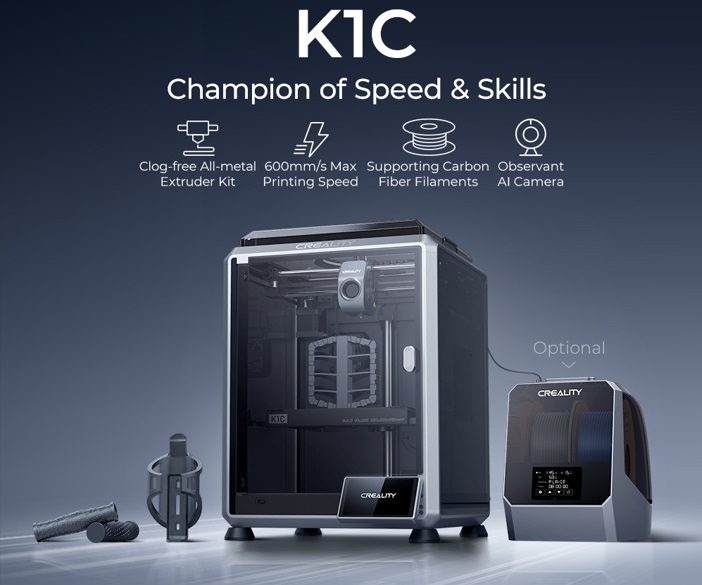
Creality K1C Printer Technical Specifications
Specifications Overview:
- Printing Technology: FDM
- Build Volume: 220*220*250mm
- Max Printing Speed: ≤600mm/s
- Extruder: All-metal direct drive
- Nozzle Temperature: ≤300℃
- Build Surface: PEI flexible build plate
- Leveling Mode: Hands-free auto-leveling
- Supported Filaments: Wide range including PLA-CF, ABS, PLA, PETG, TPU, ASA, and carbon fiber composites like PA-CF, PET-CF
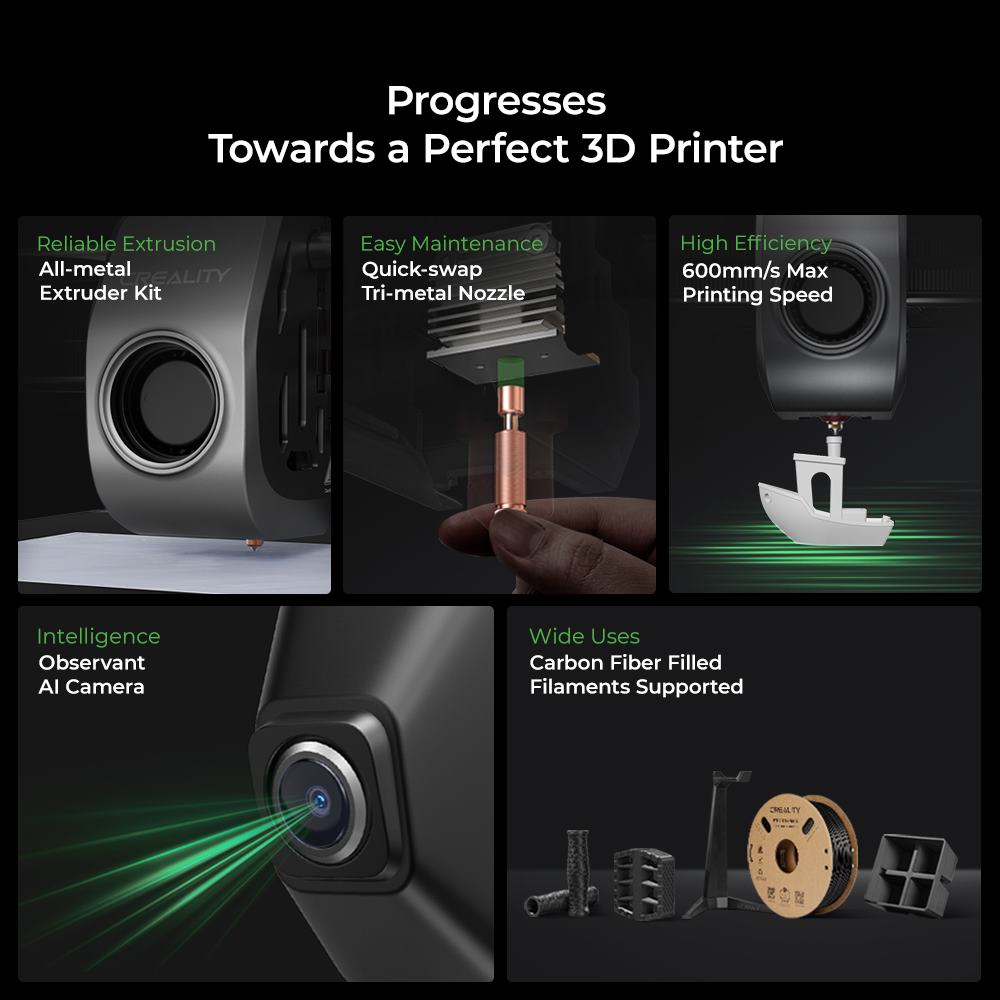
Creality K1C Printer Technical Innovations
1. Champion of Speed and Skills
1.1 Reliable Extrusion
The K1C boasts an all-metal extruder kit, ensuring enhanced reliability during printing. With a bolster spring and ball plunger, the extruder maintains a strong grip on the filament, providing consistent and clog-free extrusion for over 1000 hours.
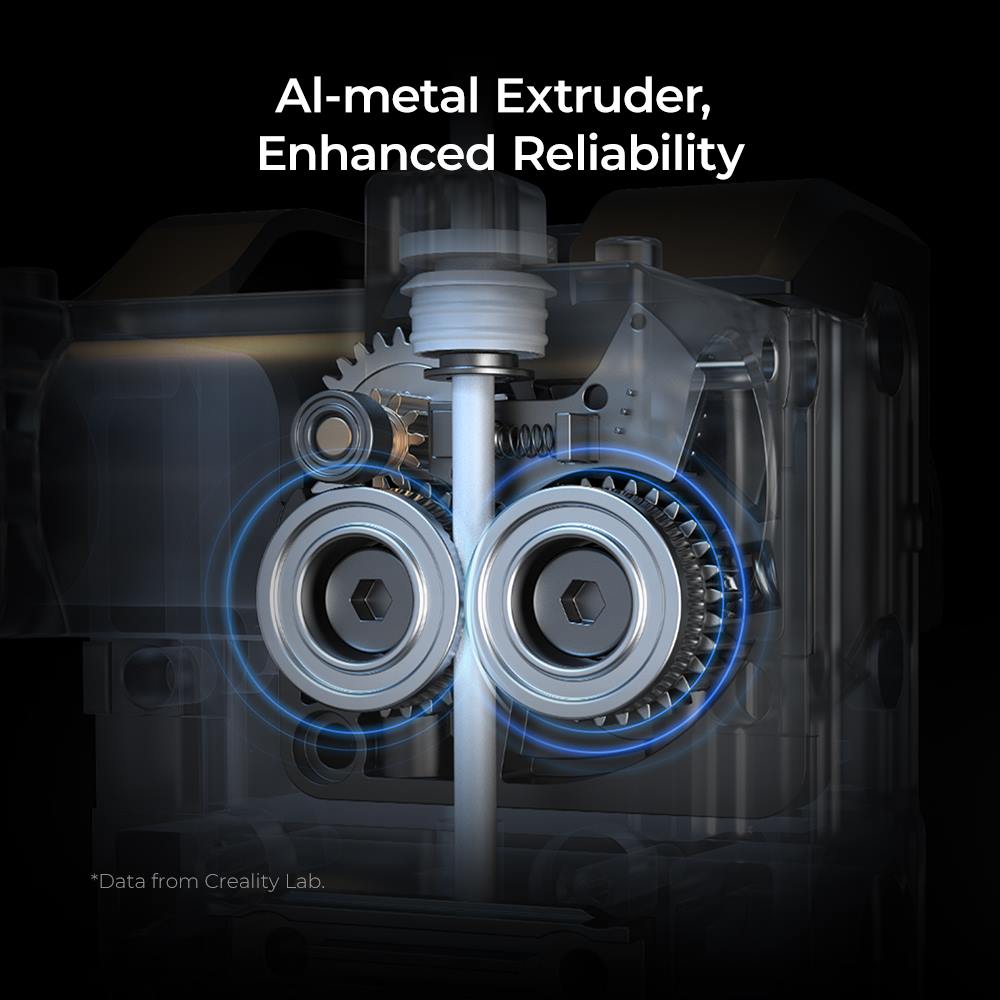
1.2 Quick-swap Tri-metal Nozzle
Featuring a tri-metal “Unicorn” nozzle with a steel-tipped copper build, integrated with a titanium alloy heat break, the K1C allows for easy one-handed swapping. This design prevents heat creep and ensures durability, providing smooth feeding and great durability.
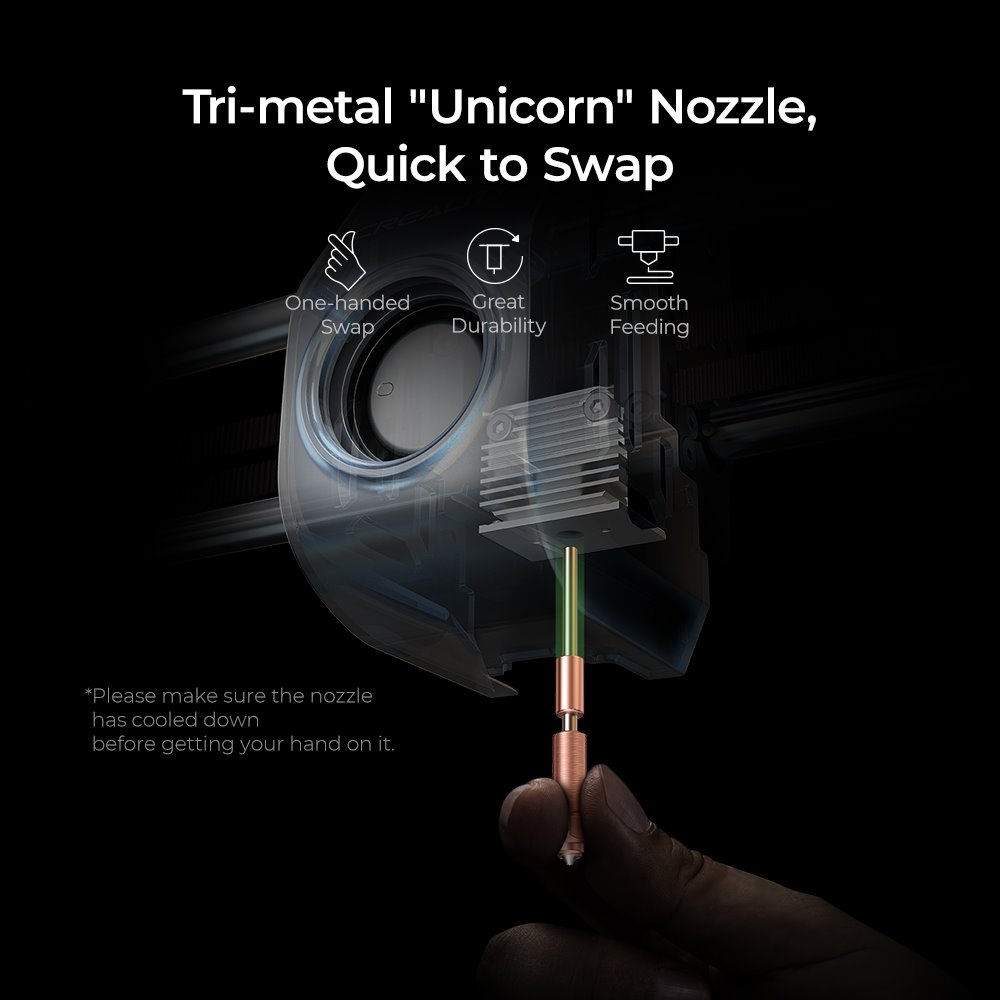
1.3 600mm/s Max Printing Speed
Powered by a CoreXY motion structure, the K1C achieves an astounding maximum printing speed of 600mm/s. This speed is complemented by a max acceleration of 20000mm/s², making it a true champion in the realm of 3D printing.
1.4 Supporting Carbon Fiber Filaments
Unleash your creativity with a 3D printer that supports a wide range of filaments. The K1C’s 300℃ hotend and hardened steel nozzle tip make it compatible with high-temperature and wear-resistant filaments, including carbon fiber variants.
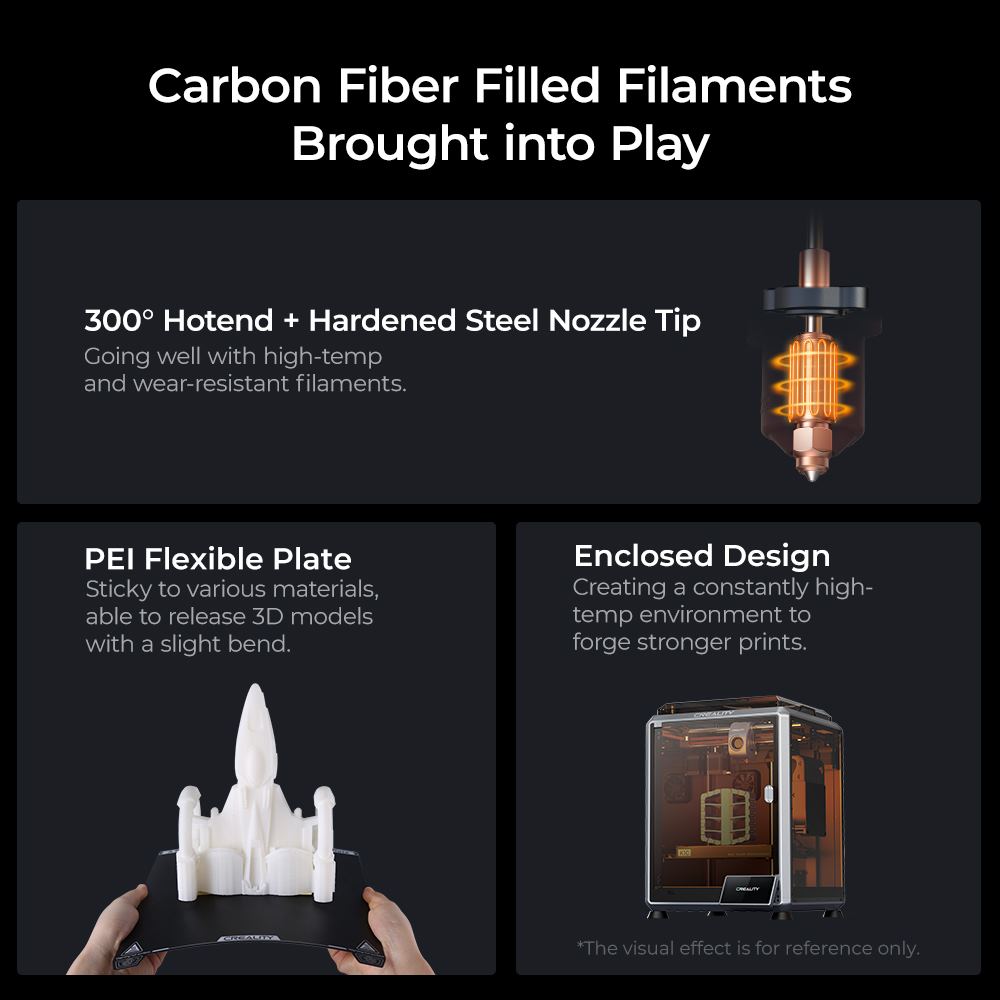
1.5 Intelligent AI Camera
Equipped with an AI camera, the K1C provides active error alerts, real-time monitoring, and time-lapse filming, ensuring a seamless and worry-free printing experience.
1.6 Wider Uses: Carbon Fiber Printing Reinvented
The K1C opens new possibilities with its compatibility with carbon fiber-filled filaments. Benefit from the mechanical strength and dimensional stability of materials like PET-CF and more, making it ideal for a variety of applications, from jigs and fixtures to prototypes.
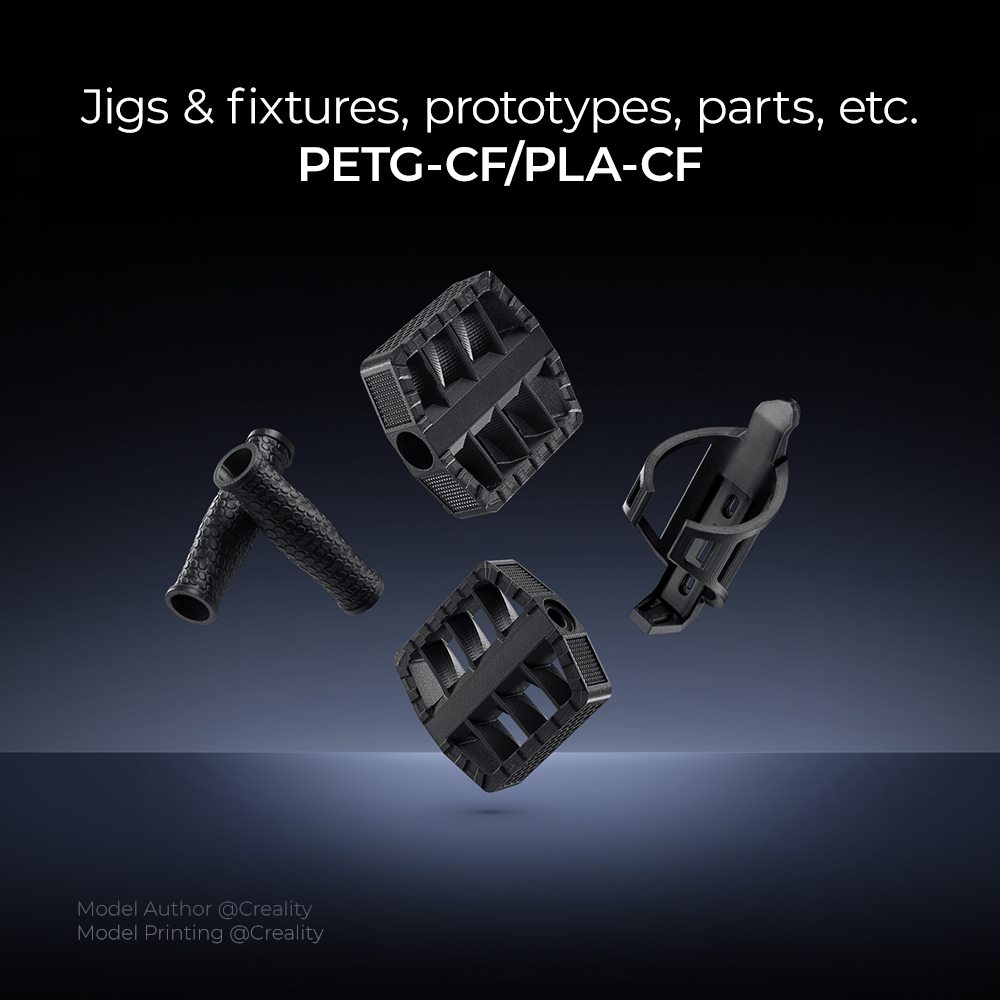
2. Carefree & Smart Operations from Start to Finish
2.1 Auto Calibration with One Tap
Experience hassle-free operations with the K1C’s auto-calibration feature. With just one tap, the printer performs self-tests, auto-leveling, auto Z offset adjustment, and input shaping tests, eliminating the need for tedious manual leveling.
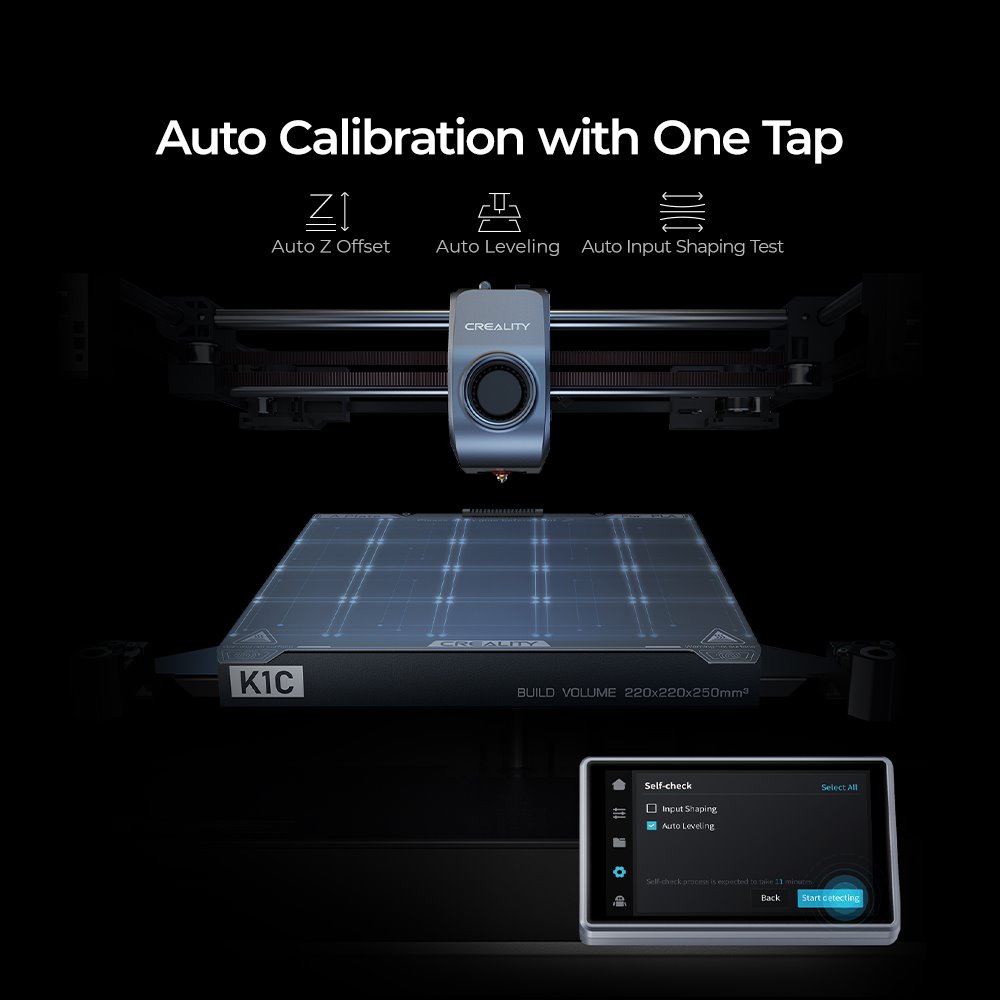
2.2 AI Camera Acts as Your Eyes
The built-in AI camera adds an extra layer of intelligence to your 3D printing experience. Detect errors, monitor progress, and enjoy the convenience of remote monitoring through Creality Print or Creality Cloud APP.
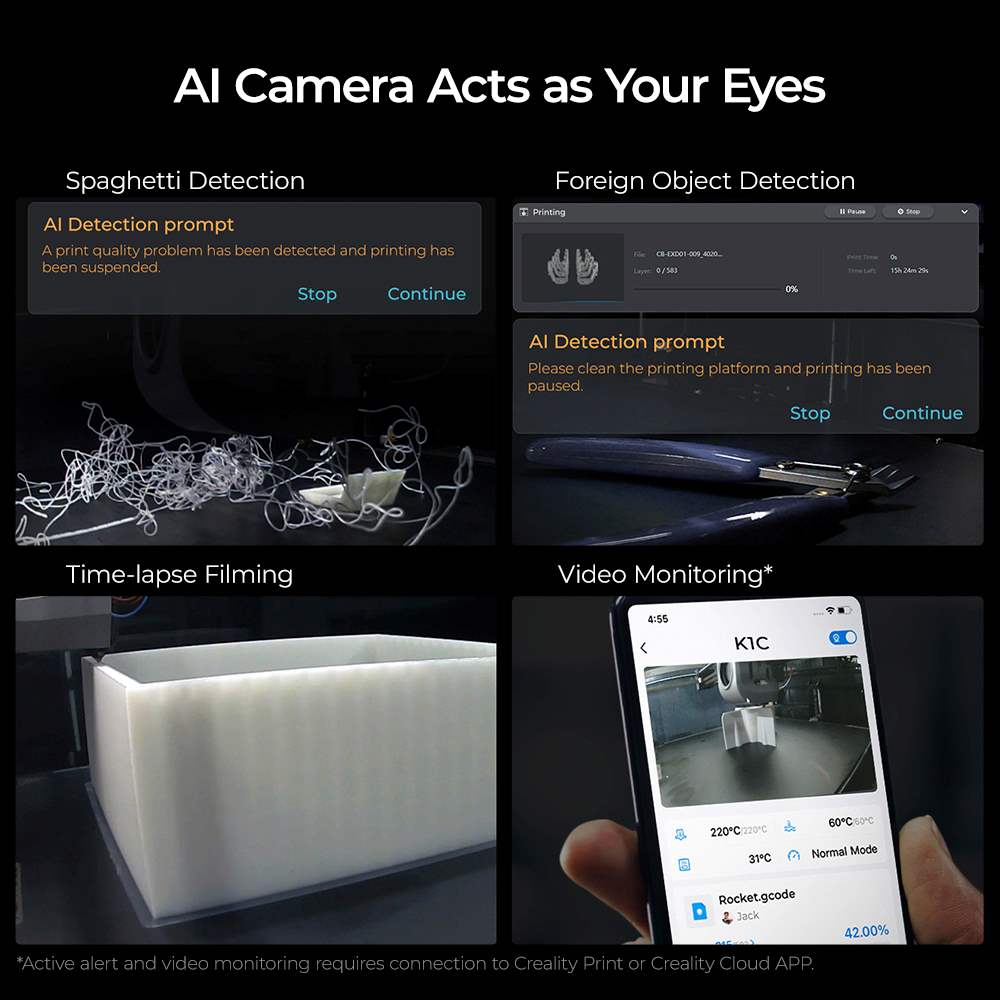
3. Champion of Speed, Indeed
3.1 CoreXY Motion Structure
Inheriting the lightweight and agile CoreXY motion structure, the K1C promises not only speed but also high print quality. With a silent mode option, the printer operates at a noise level as low as 45dB, ensuring a quiet printing environment.
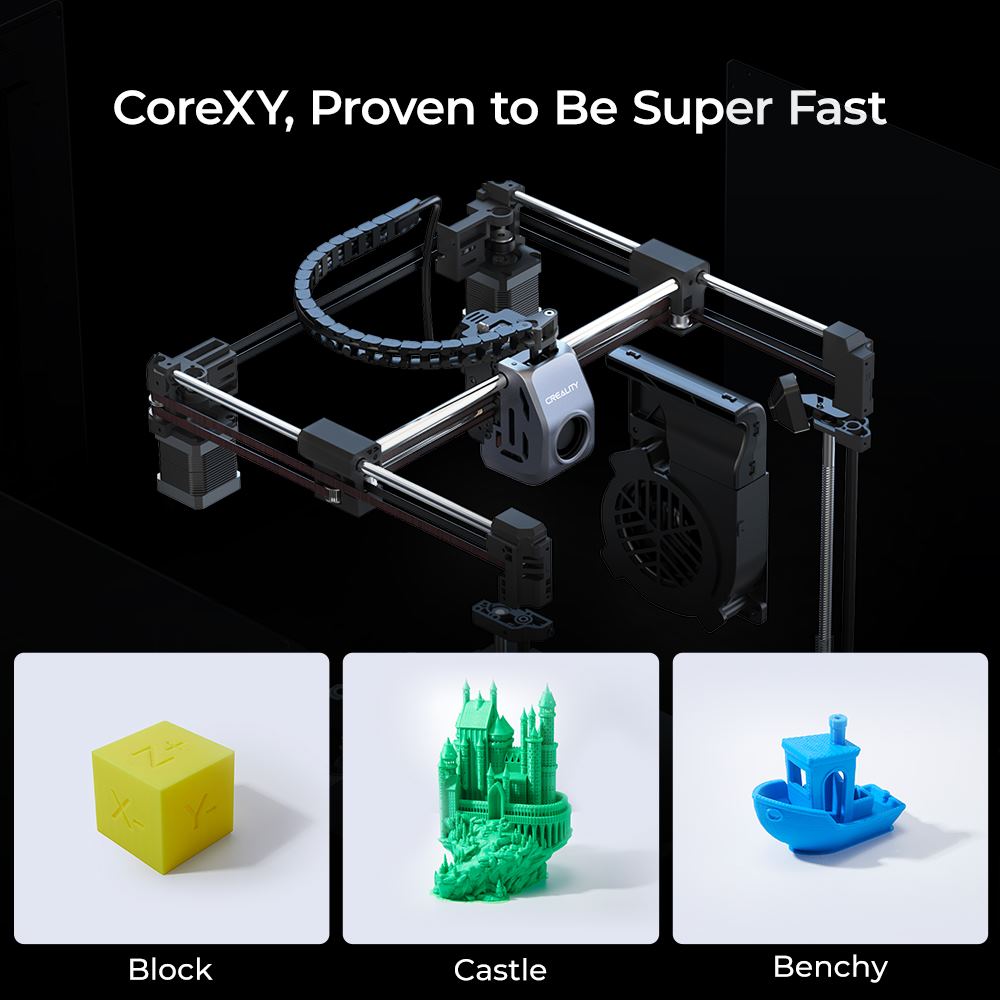
4. Contemporary Style and Robust Build
4.1 Solid Frame Using Die Cast Parts
The frame adopts bigger parts made by integrated die casting.With fewer seams, it looks neat and becomes utterly sturdy.
4.2 Glass Sides and Transparent Lid
The glass sides and the acrylic lid form up a stylish thermal enclosure,and they are transparent to reveal what’s going on inside.
4.3 Active Carbon Filter for Clean Air
The K1C utilizes an active carbon filter to purify compounds and particles, offering a pleasant and clean printing environment.
4.4 Details, All for the Best
The K1C incorporates various features for enhanced user experience, including pre-installed damping pads, a reliable damper hinge, an anti-shatter film, a reinforced cable chain, and a silicone wiping strip, among others.
4.5 Make K1C Even More Powerful
Enhance the capabilities of your K1C with quality optional accessories, including Creality Hyper Filaments, Creality Space Pi Filament Dryer, and a Coarsely Textured PEI Plate for better adhesion.
5. Creality OS & Superb Software
5.1 Open-source Creality OS
Based on Klipper, Creality OS empowers users with advanced functions such as linear advance and input shaping. Enjoy the freedom to customize or join the open-source community for more exploration.
5.2 Creality Print: More Than Just a Slicer
Creality Print features smart cooling, optimal retraction, slim tree supports, and a readily accessible 3D model library, offering a seamless 3D printing experience.
5.3 Creality Cloud: Engaging Online Community
Join a diverse and interesting 3D printing community with Creality Cloud. Access a 3D model library, and cloud printing capabilities, and interact with other enthusiasts.
5.4 24/7 Smart Customer Service & 1-Year Warranty
Experience peace of mind with Creality’s 24/7 smart customer service and a 1-year warranty, ensuring comprehensive support for your K1C 3D printer.
Creality K1 Series Parameter Comparison
Next, we will comprehensively introduce the K1 series parameter comparison to help readers better understand the K1C Printer.
| Market Positioning | Creality K1 Flagship Series | ||
| Model | K1 | K1 Max | K1C |
| KV |  |
 |
 |
| Release Date | 2023.4 | 2023.4 | 2024.1 |
| Printing Technology | FDM | FDM | FDM |
| Build Volume (mm) |
220*220*250 | 300*300*300 | 220*220*250mm |
| Product Dimensions (mm) |
355*355*480 | 435*462*526 | 355*355*482mm |
| Package Dimensions (mm) |
415*415*550 | 508*508*608 | 428*428*567mm |
| Net Weight(kg) | 12.5kg | 18kg | 12.4kg |
| Gross Weight (kg) | 16kg | 23kg | 16kg |
| Supported Filaments | PLA, Hyper PLA, PETG, ABS,TPU,ABS,PA | ABS/PLA/PETG/PET/TPU/PA/ABS
/ASA/PC/PLA-CF/PA-CF/PET-CF |
|
| Printing Accuracy | 100±0.1mm | 100mm±0.1 | 100±0.1mm |
| Layer Height | 0.1-0.35mm | 0.1-0.35mm | 0.1-0.35mm |
| Filament Diameter | 1.75mm | 1.75mm | 1.75mm |
| Build Surface | Flexible build plate | Flexible build plate | PEI flexible build plate |
| Heatbed Temperature | 100℃ | 100℃ | ≤100℃ |
| Nozzle Temperature | 300℃ | 300℃ | ≤300℃ |
| Extruder Count | 1 | 1 | 1 |
| Nozzle Diameter | 0.4mm | 0.4mm | 0.4mm |
| Printing Speed | 300mm/s | 300mm/s | 300mm/s |
| Max. Printing Speed | ≤600mm/s ≤20000mm/s² |
≤600mm/s ≤20000mm/s² |
≤600mm/s ≤20000mm/s² |
| Display Screen | 4.3″ color touch screen | 4.3″ color touch screen | 4.3″ color touch screen |
| UI Languages | 10 Languages: English, Spanish, German, French, Russian,
Portuguese, Italian, Turkish, Japanese, Chinese |
||
| Rated Input Voltage | 100-120V~/200-240V~ | 100-240V~ | 100-240V~, 50/60Hz |
| Output Voltage | 24V | 24V | 24V |
| Rated Power | 350W | 1000W | 350W |
| Silent Mainboard | Yes | Yes | Yes |
| Extruder | Dual-gear direct drive extruder | Dual-gear direct drive extruder | All-metal direct drive extruder |
| Dual Z-axis | 3 Z-axis | 3 Z-axis | 3 Z-axis |
| Leveling Mode | Hands-free auto leveling | Dual hands-free auto leveling | Hands-free auto leveling |
| Air Purifier | x | x | √ |
| Sleep Mode | x | x | √ |
| Input Shaping | √ | √ | √ |
| Lighting Kit | √ | √ | √ |
| Power Loss Recovery | √ | √ | √ |
| Filament Runout Sensor | √ | √ | √ |
| Remote Printing | √ | √ | √ |
| Enclosure | √ | √ | √ |
| Remark | AI Camera(Optional) | AI Camera, AI LiDAR | AI Camera |
| File Transfer | USB drive, WiFi | USB drive, WiFi | USB drive, WiFi |
| Printable File Format | G-Code | G-Code | G-Code |
| Slicing Software | STL, OBJ, AMF | STL, OBJ, AMF | STL, OBJ, 3MF |
| File Formats for Slicing | Creality Print; Cura, Simplify3D, PrusaSlicer | Creality Print, Cura 5.0 and later version | |
3. Creality K1C Printer Applications
| Applications | Filament | Features | Use |
| Robot Model | PLA | Most common 3D printing material,
low cost, easy to print |
Can be used to print the exterior shell of
robots and non-critical structural parts. |
| PLA-CF | Higher stiffness and strength | Used to print robot parts that need to withstand greater
forces, such as the robot’s main support structure. |
|
| PETG | Wear-resistant with high-impact strength | Can be used to print robot gears and other moving parts | |
| ABS | Strong, Impact-resistant & Heat-resistant | Suitable for printing robot parts that must withstand
high-temperature environments |
|
| ASA | Good UV resistance and wearability | Suitable for printing robot parts used outdoors. | |
| TPU | Flexible filament | Can be used to print robot tires and
other parts that require flexibility |
|
| PA | Wear-resistant & Impact-resistant | Perfect for printing robot gears and high-strength parts. | |
| PC | High strength & Heat resistance | Suitable for printing robot parts that must withstand
extremely high loads or temperatures. |
|
| PA-CF | Extremely high stiffness and strength | suitable for printing the robot’s main support structure
and parts that bear high loads. |
|
| Architectural
Model |
PLA | Mainstream 3D printing material, easy
print, high precision, multicolor option |
Can be used to print the main body of architectural
models, such as walls and roofs. |
| PLA-CF | A mixture of PLA and carbon fibers,
higher strength and stiffness |
Suitable for printing parts that require higher strength,
such as support columns of buildings. |
|
| PETG | Good toughness and weather resistance | Suitable for printing parts that need to withstand
pressure, such as bridges and support structures. |
|
| ABS | High strength and good heat resistance | Suitable for printing parts that need to withstand high
temperatures, such as chimneys or ovens in models. |
|
| ASA | High weather resistance | Suitable for printing parts exposed to prolonged sunlight,
like model exteriors, walls, and roofs. |
|
| TPU | High elasticity | Can be used to print flexible parts, such as model doors,
window curtains, or small decorative items. |
|
| PA | High wear resistance &
chemical corrosion resistance |
Suitable for printing parts that require wear resistance,
such as floors or steps |
|
| PC | High transparency | Can be used to print parts that require a transparent
effect, such as windows or glass curtain walls. |
|
| PA-CF | A mixture of PA and carbon fibers,
higher strength and stiffness |
Ideal for printing bridges or
load-bearing walls in buildings. |
|
| Automotive
Design & Manufacturing |
PLA | High hardness but greater brittleness. | Can be used to print the car’s exterior shell or other
parts that do not need to withstand much pressure. |
| PLA-CF | Higher strength and stiffness | Suitable for printing the car’s protective bars or bumpers. | |
| PETG | Good toughness and heat resistance | Great for printing car engine parts or internal structures | |
| ABS | Good heat resistance & impact resistance | Can be used to print the car’s chassis or tires | |
| ASA | Excellent wearability and UV resistance | Suitable for printing the car’s external trim pieces. | |
| TPU | Good wear resistance and toughness | Suitable for printing the car’s seats or interior trim. | |
| PA/PA-CF | Excellent mechanical properties,
heat resistance |
Can be used to print engine parts
or transmission systems. |
|
| PC | High-impact resistance & transparency | Suitable for printing car windows or light covers. | |
| Furniture Design | PLA | Most common use, made from plant starch
with biodegradable properties. |
Can be used to print decorative and non-structural parts,
such as lampshades, vases, or small decorative objects. |
| PLA-CF | Modified form of PLA, with added carbon
fibers to increase its strength and stiffness. |
Can be used to print parts that require higher strength
and stiffness, such as the frame of a table or chair. |
|
| PETG | Durable plastic with good impact
strength and flexibility |
An ideal choice for printing chair legs or tabletops. | |
| ABS | Plastic with high-strength
and wear resistance |
Great for printing the seat of a chair or the top of a table. | |
| ASA | A plastic with excellent weather
resistance and UV resistance |
Suitable for printing furniture that will be used outdoors,
such as patio furniture or garden furniture. |
|
| TPU | Excellent flexibility | Suitable for printing parts that require some elasticity
and softness, such as chair cushions or sofa pads. |
|
| PA | Wear-resistant and impact-resistant | Ideal for printing parts requiring high load-bearing
capacity, like bed bases or table supports. |
|
| PC | Strong and transparent plastic | Great for printing glass tabletops or transparent ornaments | |
| PA-CF | Modified form of nylon, with added carbon
fibers to enhance its strength and stiffness |
Perfect for printing strong and stiff parts,
like table legs or chair frames. |
|
| Automotive
Manufacturing |
PLA | Biodegradable material with good printing
performance and sufficient strength |
Can be used to print interior decorative pieces,
such as decorative panels on the inside of car doors, small storage boxes in the car, cup holders, etc. |
| PLA-CF | High rigidity, strength, and lower weight | Great for printing structural body parts and
seat frames, etc. |
|
| PETG | High strength, impact resistance,
and good flexibility |
Ideal for printing car exterior components
like bumpers and spoilers. |
|
| ABS | High strength and heat resistance | Can be used to print engine covers, wheel rims,
brake system components, etc. |
|
| ASA | Weather resistance & high wear resistance | Can be used to print car roofs, window frames, etc. | |
| TPU | Good elasticity and wear resistance | Can be used to print car seat cushions, seat coverings,
suspension system components, etc. |
|
| PA/PA-CF | High strength, wear resistance &
good chemical resistance |
Can be used to print gears, bearings,
connecting rods, crankshafts, etc. |
|
| PC | High impact strength, transparency,
and good heat resistance |
Can be used to print car windows, light covers, etc. |
Note: Applications of K1C extend to chair backs, door handles, car trunk buckles, drones, cars, boats, kitchen setups, bathroom setups, bedroom setups, office desk scenarios, electric skateboards, and more. Various usage scenarios await your exploration and experimentation.
FAQs about Creality K1C 3D Printer
1. Is the Creality K1C already on sale?
It will be available for pre-order from Jan 25th.
2. What is the price of the Creality K1C?
The price for the K1C is £539 (please note that the specific price may fluctuate based on festivals and events).
3. What are the discounts for the K1C pre-sale event?
- Customers can enjoy an extra 5% off pre-order offer when you pre-order the K1C 3D printer at the Creality Official Store. Pre-order offer is valid from Jan. 24 to Feb. 6.
- For customers who pre-order the K1C during the pre-order period, one lucky winner will be randomly selected to receive the K1C for free and get a full refund. Winner will be announced after pre-order offer ends.
- Customers may claim a 1-year free Creality Cloud Premium after receiving the K1C 3D printer. Learn more about how to redeem this benefit here.
4. Why is it called K1C, and what makes it a high-speed 3D printer for carbon fiber materials?
The “C” signifies its support for carbon fiber materials. Features like a powder metallurgy lever, lateral spring support, and built-in filament detection make it reliable. The integrated nozzle system ensures smooth filament flow for quality carbon fiber prints.
5. What are the key speed and quality features of the Creality K1C 3D Printer?
The CoreXY motion structure enables high-speed printing with excellent precision. Dual cooling ensures quick and quiet printing, and mechanical optimizations, like a 20-tooth gear and improved fan balancing, contribute to enhanced print quality. The user-friendly design requires no assembly or calibration.
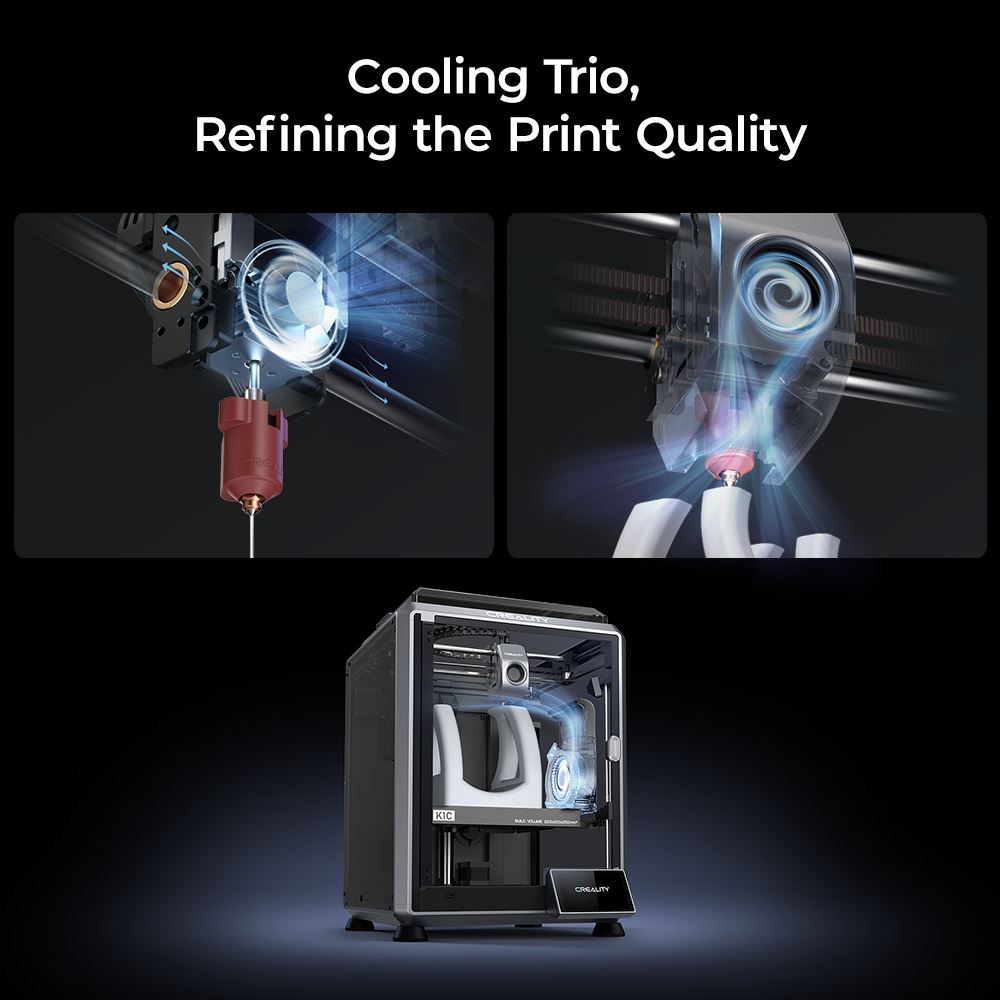
6. What additional support and convenience features does the Creality K1C 3D Printer offer?
The K1C provides an AI camera for fault detection, foreign object detection, and remote monitoring. It supports side-loading filament and offers software-assisted operations through the open-source Creality OS. Users can skip printing a defective model during batch printing with Creality Print. The machine includes damping pads, reinforced cable chains, a silicone wiping strip, and additional accessories for enhanced reliability and convenience.
7. What are the notable optimizations in the Creality K1C 3D Printer, and how does it enhance material diversity?
The K1C introduces upgrades like a built-in camera, carbon filter for air purification, and support for various materials, including engineering and standard filaments. These enhancements come at no additional cost, ensuring a versatile and high-performance 3D printing experience.
8. How does the Creality K1C balance speed and quality in its printing process?
The K1C maintains high-speed printing with its CoreXY motion structure. Upgrades in the extruder, hotend, synchronous belt (20 teeth), and cable chains contribute to speed and quality improvements. This ensures a consistent and reliable printing experience.
9. What user-friendly features make the Creality K1C an easy-to-use 3D printer?
The K1C simplifies the 3D printing process with its out-of-the-box functionality, automatic features such as leveling, height adjustment, and flow optimization. The nozzle assembly is easily replaceable for user convenience, making it an ideal choice for both beginners and experienced users.
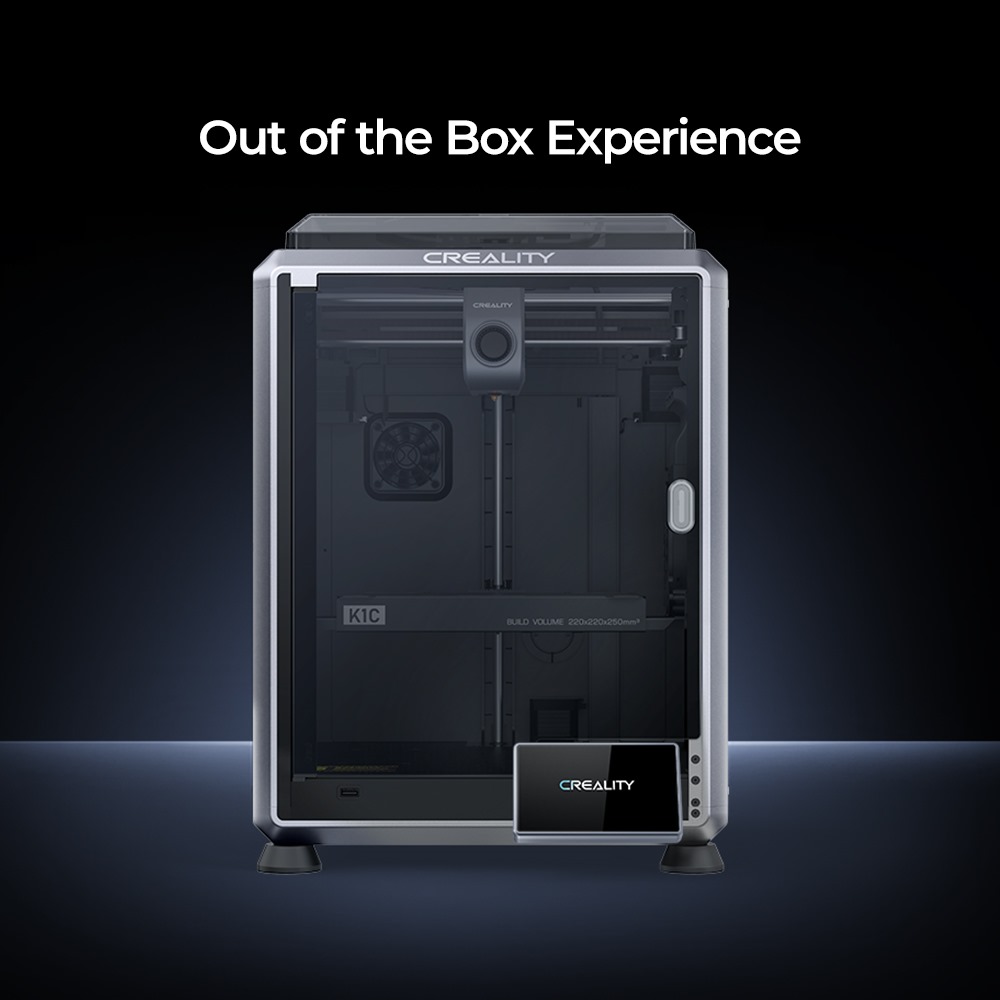
Conclusion
The K1C is not just a 3D printer, it is a comprehensive solution for demanding printing tasks, offering a blend of speed, durability, and advanced features. With the backup of a 1-year warranty, 24/7 customer service, and a rich hardware and software ecosystem, the K1C is poised to be a game-changer in the world of 3D printing. Whether you’re producing jigs & fixtures, prototypes, product shells, or toys, the Creality K1C stands ready to deliver high-quality prints at remarkable speeds.










